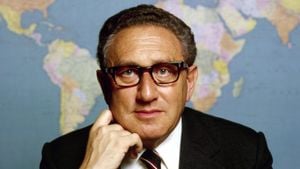The Gaza conflict continues to escalate, drawing increasing international concern as humanitarian crises deepened amid relentless violence. Global leaders and aid organizations have voiced urgent apprehensions about the dire need for aid delivery to Gaza, particularly following the Israeli parliament's controversial decision to ban the United Nations Relief and Works Agency (UNRWA) from operating within the territory.
On October 29, 2024, UN Secretary-General Antonio Guterres expressed the gravity of the situation, stating, "There is no alternative to UNRWA," underscoring the agency's irreplaceable role. The UN agency has been pivotal not only for humanitarian aid but for resource management across communities severely affected by conflict.
Meanwhile, the situation has become increasingly complex. Just prior to this announcement, Israeli airstrikes hit northern Gaza, leveling significant residential structures, including a five-storey building where numerous displaced families had sought refuge. Reports indicated at least 109 Palestinians were killed during these aerial bombings, adding to the regions already suffering from high casualty rates.
The troubling developments didn't stop with the Israeli airstrikes. The humanitarian situation has grown dire due to severe restrictions imposed on aid flows. Medical sources indicate more than 100,000 people remain stranded amid the violence, particularly vulnerable populations including women and children who have no access to necessary medical supplies or food.
UN agencies are sounding alarms. The World Food Program called for immediate action to avert potential famine, warning the humanitarian catastrophe could worsen with the current circumstances. Only 5,000 tonnes of aid had entered Gaza this month, far from what is needed to assist rapidly increasing needs. The UN reports there are approximately 94,000 tonnes of food currently stockpiled and ready to be delivered; the funds, resources, and escaping routes are the real obstacles. Restrictions at borders and checkpoint delays have rendered significant aid unable to reach those desperately awaiting assistance.
Extensive violence has prompted calls from various international actors, including the US, where State Department Spokesperson Matthew Miller expressed serious concerns over the alarming death toll and described the attacks as horrific. The US government has reportedly communicated its apprehension directly to Israel, advocating for measures to improve humanitarian conditions.
Simultaneously, Norway indicated plans to propose a resolution to the United Nations General Assembly to seek the International Court of Justice's opinion on Israel's obligations to facilitate humanitarian aid for Palestinians. These responses underline attempts by various nations to alleviate some of the humanitarian pressure building as the conflict drags on.
Alarming reports also continue to emerge from local sources, detailing increased attacks on civilians and infrastructure. Civil defense teams reported casualties from strikes targeting busy civilian marketplaces, with hundreds injured as uncertainty looms over the safety of daily routines.
Under these pressing circumstances, humanitarian organizations like Doctors Without Borders (MSF) continue to witness the devastating impact of violence on their personnel and mission operations. Recently, MSF mourned the loss of Hasan Suboh, one of its colleagues who was tragically killed during advanced airstrikes by Israeli forces. This incident highlights the growing toll of the conflict on those dedicated to providing much-needed medical and humanitarian assistance.
Notably, Suboh's dedication is symbolized through his worn MSF vest, now lying under the rubble as testimony to the risks humanitarian workers face. MSF has condemned these attacks, demanding immediate action to halt violence against healthcare professionals and civilians alike. It’s horrifically clear—the rights of humanitarian operations are increasingly jeopardized on the ground.
The tension between military operations and humanitarian needs poses challenging questions to stakeholders on both sides. On one end, governments are grappling with the intersection of military strategy with public sentiment and international law; on the flip side, local populations are expecting immediate relief and protection.
Activists and human rights groups have not shied away from speaking out against the deteriorations seen on the ground either. Protests have erupted across various cities, decrying what many call unjust actions against Palestinians. This public pressure has pushed several leaders and organizations to reevaluate how aid can be delivered effectively without political hindrances.
Indeed, the humanitarian impact of the conflict cannot be overstated. Families continue to flee from conflict-ridden areas, seeking safety, yet finding little respite as borders close and checkpoints become even harder to navigate. Those displaced have found themselves without home or hope and are increasingly reliant on dwindling aid supply.
The United Nations and various NGOs are working tirelessly, yet the maze of politics, military actions, and logistical red tape create insurmountable obstacles to delivering timely assistance. With winter approaching and food supplies strained, the stakes are high for maintaining humanitarian support under harsh conditions.
Global discussions focus on shifting how aid is approached and delivered. Renewed calls for dialogue and negotiation surround efforts to find paths to peace. Without the cooperation of governing bodies, the dire conditions of those trapped within Gaza’s borders will only continue to worsen.
It remains to be seen how international diplomacy will respond to the spiraling humanitarian crisis. The situation requires urgent action, and many fear there will be severe consequences if reliable aid channels are not reinstated swiftly. Meanwhile, on the ground, the lives of ordinary citizens hang in the balance, as they navigate overwhelming hardship amid relentless conflict. The hope for peace and stability remains dim, but perhaps not impossible, if compelling action is undertaken now.
Despite the shadow of violence, the strength and resilience of the Gaza people shine through. They have endured punctuated moves toward conflict meaning their call for basic human rights and necessities must echo loudly beyond international chambers and headlines. The winds of change, though subtle, are gathering strength—will they be heard before it’s too late?



